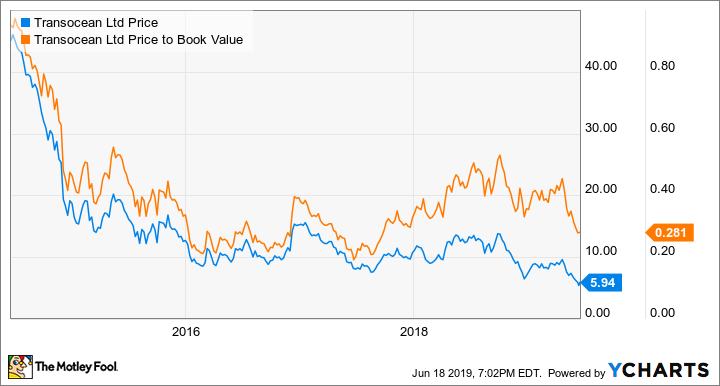3 Top Oil Stocks to Buy Right Now
Considering how volatile the oil industry has been in recent years, it wouldn't be surprising if brokers were handing out airsickness bags with each oil stock purchase. Every time the market gets a whiff of higher oil prices, there is news of immense output increases in America that leaves the global market in a constant state of oversupply. That, in turn, sends oil prices plummeting, and companies scale back their spending plans even further.
As bad as it has been over the past few years, it's always important to remember that the oil industry is cyclical. A lack of spending today means an eventual shortage down the road. With that in mind, we asked three Motley Fool contributors to each highlight a stock they see as worth considering right now. Here's why they picked Transocean (NYSE: RIG), Royal Dutch Shell (NYSE: RDS-A) (NYSE: RDS-B), and Enterprise Products Partners (NYSE: EPD).

Image source: Getty Images.
Emerging from the depths
Jason Hall (Transocean): The past few years have been horrible for investors who've put capital in the offshore drilling segment. As of this writing, Transocean's stock is down more than 85% from the price five years ago, and it sells for 28% of book value:
So what makes it worth buying now? A few things:
Offshore oil producers are starting to increase spending on drilling and exploration after four years of spending cuts.
A substantial amount of consolidation of the global drilling fleet has occurred in recent years.
More spending is being directed to resources in ultra-deepwater and harsh conditions.
This combination of factors plays directly into Transocean's favor. The company owns one of the most capable fleets of floating drilling vessels on the water, and the shift in focus is expected to result in a tightening of supply of drillships over the next few years, pushing up day rates and shifting the leverage back to the drillers.
Simply put, I think we are very near the trough in the offshore sector, and investors who buy Transocean now should do incredibly well over the next five years. I'll be blunt with this caveat: There's no saying things won't get worse before they get better. Even as drilling activity has picked up this year, investors have continued to sell.
If you're willing and able to weather what will likely be stormy seas, Transocean could deliver massive gains over the next half decade. How strong is my conviction? I've personally bought more shares of Transocean twice this month.
Time and time again
John Bromels (Royal Dutch Shell): Oil major Royal Dutch Shell is one of those companies in which there's seldom a bad time to invest. Right now, for example, the company's dividend yield of 5.9% is virtually tied with BP for the top spot among the oil majors, while its P/E ratio and price-to-free cash flow ratio are the lowest among its Big Oil peers (lower is better).
Shell is a very well-managed company, which shows up in its return metrics -- a way to gauge managerial effectiveness. Its return on equity of 11.9%, its return on capital employed of 12.5%, and its return on invested capital of 8.3% are the highest among the oil majors. And for the first two of those metrics, it's not even a close contest! Shell's management showed its savvy recently when it announced it wasn't going to pay a premium for assets in the red-hot Permian Basin.
Shell's recent string of impressive quarterly earnings should also encourage investors that June is an excellent time to consider picking up shares of this consistent outperformer.
Don't overthink it. Take the good performers during the downturn
Tyler Crowe (Enterprise Products Partners): Oil has been in the doldrums for years. So of course there are some investors with a contrarian bent in them to gravitate toward stocks that have the "highest upside" should oil and gas prices go higher.
If there is one thing we have learned over the past five years of low and volatile oil prices, it's that many companies cannot create value for investors when times are bad. Anyone looking to make a long-term investment in this sector should remember this downturn and how quickly this business can decimate shareholder value when oil prices turn south.
So instead of trying to pick through the ones that could be winners at higher prices, investors should focus their attention on companies that have remained resilient through the cycle and created some wealth for shareholders.
There aren't many out there, but pipeline company Enterprise Products Partners has done better than most in this regard. It is one of a select few companies in the oil business that have managed to produce a positive total return over the past five years thanks to its generous and slowly growing dividend. What's more, the company has been able to do that while investing considerable amounts of capital in its energy infrastructure and lowering its debt-to-EBITDA leverage.
Perhaps Enterprise's stock won't be a huge winner when oil turns up again, but these past five years have shown us that it can create some shareholder value in some of the worst times for the oil industry. If you're interested in owning a stock for the long term, that fact should greatly influence your investment priorities.
More From The Motley Fool
Jason Hall owns shares of Transocean. John Bromels has no position in any of the stocks mentioned. Tyler Crowe owns shares of Enterprise Products Partners and Transocean. The Motley Fool recommends Enterprise Products Partners. The Motley Fool has a disclosure policy.

 Yahoo Finance
Yahoo Finance 

